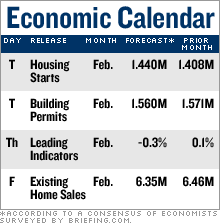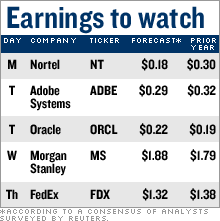All eyes on the FedAmid fresh numbers on housing and swirling subprime angst, investors hope for a calming word from the central bank.NEW YORK (CNNMoney.com) -- The stock market recovery petered out at the end of last week, and whether it can restart in the week ahead could depend on the Federal Reserve. Oracle (Charts), Morgan Stanley (Charts) and a few other marquee names report earnings next week, but of greater interest to investors will be the two-day Federal Reserve policy meeting on Tuesday and Wednesday. The bankers are widely expected to hold a key short-term rate steady at 5.25 percent for the sixth meeting in a row, as they continue to weigh the threat of slower growth with higher pricing pressure going forward. That debate was demonstrated last week when reports on producer and consumer prices showed rising inflation, and reports on manufacturing and retail sales showed a slowdown. As always, investors will be focused on what the statement says about the outlook for the economy, inflation and interest rates - and whether that outlook has been affected by the recent roiling of the financial markets. (Full story) Nearly three weeks removed from a global market plunge, stocks have essentially gone nowhere, seesawing sharply day-to-day as investors wrestle with whether they should jump back in or wait out the storm a little longer. "We're in a correction and it's doing exactly what a correction should do, which is scare people a little," said Douglas Roberts, managing principal at Channel Capital Research Institute. "You see the market moving up or down by 1 or 2 percent nearly every day," he added. "That grinding trading range will eventually move us higher." The Dow ended last week about 675 points below its all-time high of 12,786.64 hit on February 20th and not far from where it stood shortly after the selloff of Feb. 27th. On that day a plunge in Asian markets caused a domino effect, sending markets around the world tumbling as nervous investors abandoned the Good Ship Rally on worries about global growth. Since then, stock investors have been trying to take a more balanced look at the unraveling, falling as it did on the heels of an 8-month advance. However, recovery attempts have been erratic due to revived worries about slowing earnings and questions about the fallout from the collapse of the housing market. "Investors at this point are uncertain about how the trouble in subprime and general weakness in housing is likely to play out in the months ahead," said Michael Sheldon, chief market strategist at Spencer Clarke. The week ahead brings reports on February housing starts and building permits and existing home sales. (See chart for details). Barely in the everyday vernacular a month ago, "subprime" has become the new trigger word for nervous bulls. That's because over the past few weeks, many subprime mortgage lenders - whose customers tend to have weak credit - have seen a spike in defaults on loans. The glut of defaults are a result of the breakdown in the previously booming housing market and the delayed impact of rising interest rates between 2004 and 2006. Wall Streeters have been worried about how this might impact the broader financial sector, the housing market and the economy - a concern ex-Fed chief Alan Greenspan gave voice to late last week. (Full story). Fears about the subprime issue spreading were somewhat tempered by bullish earnings reports last week from Goldman Sachs (Charts), Bear Stearns (Charts) and Lehman Brothers (Charts). All three Wall Street banks sought to downplay the impact from subprime on the broader mortgage market and even said it could open up opportunities for them. Yet, while bank earnings may hold up, broader S&P 500 earnings are set to slow dramatically. (Full story). All of which suggests more choppy trading in the near term - and possibly another leg down. "In terms of the stock market," Sheldon said, "there's probably a bit more to the current correction within the context of a longer term bull market." |
|



